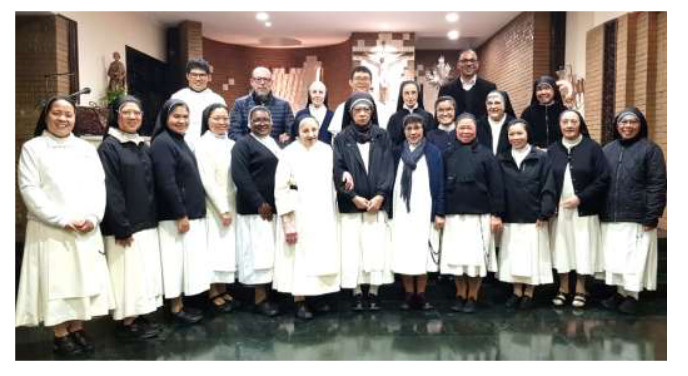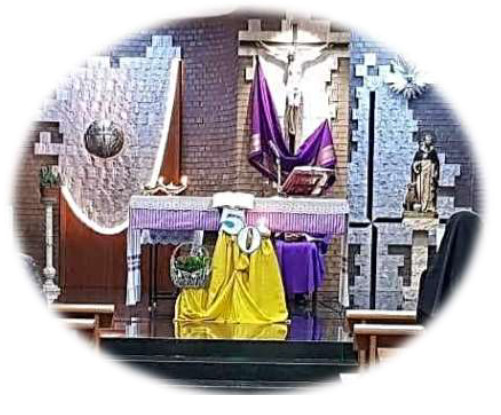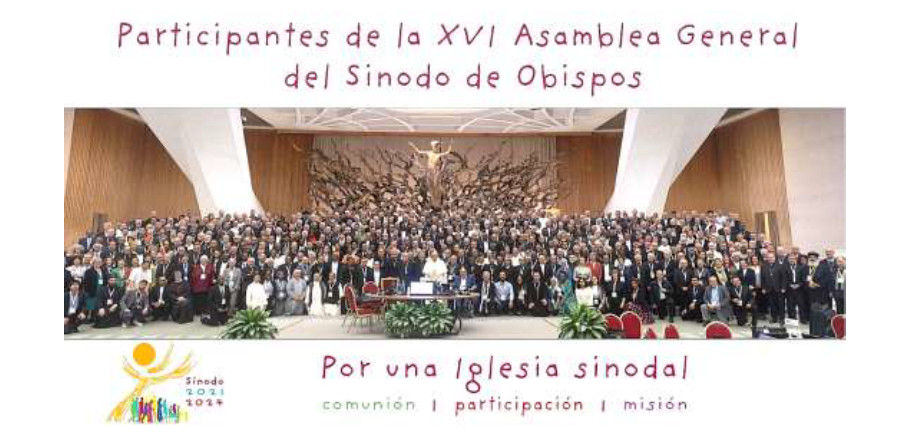
 Son muchos los sentimientos que se acumulan en tu mente y en tu corazón, pero lo que resuena
Son muchos los sentimientos que se acumulan en tu mente y en tu corazón, pero lo que resuena
con gran fuerza desde el fondo de tu alma es la palabra ¡gracias Señor!, por haber llegado
hasta aquí.
Leer documento completo en PDF

 Son muchos los sentimientos que se acumulan en tu mente y en tu corazón, pero lo que resuena
Son muchos los sentimientos que se acumulan en tu mente y en tu corazón, pero lo que resuena
con gran fuerza desde el fondo de tu alma es la palabra ¡gracias Señor!, por haber llegado
hasta aquí.
Leer documento completo en PDF

 Hacer de nuestra casa un hogar:
Hacer de nuestra casa un hogar:La historia de nuestro Instituto comenzó en un granero; después de no pocas vicisitudes y esfuerzos, la Congregación compró un grande pero económico terreno en una zona tranquila en las afueras de Roma, donde compartían residencia varios institutos religiosos, el pequeño Vaticano.
Leer documento completo en PDF

 El año que comenzaremos muy pronto, deberá ser mejor y eso dependerá de nosotras, si sabemos mirar y ver los acontecimientos de lo que ocurre a nuestro alrededor, saber de cómo nosotras afrontaremos esos acontecimientos con sus circunstancias y los problemas que llegarán.
El año que comenzaremos muy pronto, deberá ser mejor y eso dependerá de nosotras, si sabemos mirar y ver los acontecimientos de lo que ocurre a nuestro alrededor, saber de cómo nosotras afrontaremos esos acontecimientos con sus circunstancias y los problemas que llegarán.
Leer documento completo en PDF

 El día 3 de noviembre llegaron a Manila la Priora General, Sor Asunción González con la Secretaria General, Sor Mary Jeanet Pintacasi. Fueron recibido con mucha ilusión por las hermanas ya que es la primera visita de la Priora General en su 2º sexenio. Al día siguiente participaron con casi todas las hermanas de la Provincia en la celebración de la Eucaristía en conmemoración de las hermanas difuntas, que tuvo lugar en el Valley of Repose de nuestra casa en Tagaytay. Comenzó la visita al día siguiente según el itinerario preparado por la Priora Provincial y su consejo. Va a estar 4 a 6 días en cada casa dependiendo del número de las hermanas de cada comunidad.
El día 3 de noviembre llegaron a Manila la Priora General, Sor Asunción González con la Secretaria General, Sor Mary Jeanet Pintacasi. Fueron recibido con mucha ilusión por las hermanas ya que es la primera visita de la Priora General en su 2º sexenio. Al día siguiente participaron con casi todas las hermanas de la Provincia en la celebración de la Eucaristía en conmemoración de las hermanas difuntas, que tuvo lugar en el Valley of Repose de nuestra casa en Tagaytay. Comenzó la visita al día siguiente según el itinerario preparado por la Priora Provincial y su consejo. Va a estar 4 a 6 días en cada casa dependiendo del número de las hermanas de cada comunidad.
Leer documento completo en PDF

 Miembros de la Familia Dominicana han estado presentes en el Sínodo con diferentes roles: Dos ex
Miembros de la Familia Dominicana han estado presentes en el Sínodo con diferentes roles: Dos ex
maestros de la Orden, el P. Timothy Radcliffe como maestro de retiros y guía espiritual, el Obispo
Aspiroz un delegado de Argentina, una Hermana Dominica de Panama, varios sacerdotes OP
participando como teólogos y expertos, 3 Hermanas como asistentes
Leer documento completo en PDF

 Our Lady of the Holy Rosary 2023
Our Lady of the Holy Rosary 2023
Dear sisters,
When the month of October begins, the celebration of the feast of Our Lady of the Rosary comes to mind, a very endearing celebration for us since we come from the roots of the Province of the Order of Preachers that bears her name and we grew as an Institution under her protection.
Today we live in a society that faces different challenges. Sometimes we feel downcast, because every day, what we see in the media and on social networks are various news and events that have to do with serious problems in today’s society: war, climate change, poverty and more…; that although we try to see the signs of God’s presence, we find opposite, negative signs that make us believe that He is absent… and we hear the question: “does it make sense to believe, does it make sense to pray?” This moves me to look back at that important historical event which led to the establishment of this feast dedicated to Our Lady of the Rosary: The Battle of Lepanto on October 7, 1571.
It is said that while the last great naval battle in history was fought in the Mediterranean, in Rome thousands of faithful recited the Rosary accompanying Pope Pius V. The battle lasted from the early hours of the morning until night, and in the morning. Then the Pope announced the happy news to all those present gathered in the square: the Holy Virgin had granted victory to the Christians. On the anniversary of this victory, Pius V established the liturgical commemoration with the advocation of Our Lady of Victories; later, his successor, Gregory XIII, changed the name of the feast to Our Lady of the Rosary.
It is not the only “victory” attributed to the intervention of Our Lady of the Rosary. Other battles were won under her image or protection. Furthermore, in the recognized apparitions of the Blessed Virgin she always carried the Rosary, indicating the importance of praying it, because in reality, at all times, together with the world of solidarity, justice, willingness for service and love, there is also the world of violence, oppression, lies, self-interest… and Our Lady has given us a tool to help us turn to God and ensure her help because a mother never abandons Our Lady of the Holy Rosary 2023 her children. In more tumultuous moments, the presence of the Blessed Virgin through the prayer of the Rosary has always been a source of strength to continue believing, continue hoping, continue aspiring and striving so that God’s plan be fulfilled in everything.
It is good to bring to our mind that Mary also experienced suffering in her own flesh. When the Lord, her son, was born in a manger, without a crib or adequate clothing, what is more cruel for a mother than to see her own son suffer misery? Furthermore, seeing her son on the cross, she suffered to the depths of her soul. But she was not discouraged, nor did she complain. She kept everything and meditated on it in her heart. She accepted reality as it came, she meditated on it from God’s perspective to capture the meaning of everything.
Mary knows very well the difficulties and sufferings that we have to endure in our lives, as well as the challenges that the world is going through. Therefore, we can hold onto her hand to sustain ourselves with strength and courage. I am convinced that praying the Rosary has an undeniable value because it means contemplating the unbreakable faith of the Blessed Virgin, and every time we pray it she confirms us in our faith, in our vocation and in our mission. She makes us see the greatness of God’s love, manifested in every mystery we meditate. Mary has shown us that believing makes sense and assures us that praying also makes sense.
At the Battle of Lepanto, thousands of Christians recited the Rosary with the Pope. I also believe that praying it in community, as a family, as groups of believers adds strength to this precious prayer. It is worth spreading her devotion.
Let us ask Our Lady of the Rosary to sustain us in our pilgrimage in this world and to help us transform our faith into a proclamation of the Gospel.
Happy feastday to everyone
With my fraternal embrace and prayer
Sor Mª Asunción González, O.P.
Prioress General

 Nuestra Señora del Rosario 2023
Nuestra Señora del Rosario 2023Queridas hermanas:
Cuando comienza el mes de octubre me viene al pensamiento la celebración de la fiesta de Ntra. Señora del Rosario, una celebración muy entrañable para nosotras ya que venimos de las raíces de la Provincia de la Orden que lleva su nombre y crecemos como Congregación bajo su protección.
Hoy día vivimos en una sociedad que se enfrenta con distintos desafíos. A veces nuestro estado de ánimo se decae, porque cada día, lo que vemos en los medios de comunicación y en las redes sociales son diversas noticias y sucesos que tienen que ver con problemas graves de la sociedad actual: la guerra, el cambio climático, la pobreza y más..; que aunque intentamos ver los signos de la presencia de Dios, nos encontramos con signos opuestos, negativos, que nos hacen creer que Él está ausente… y se oye la pregunta: “¿tiene sentido creer, tiene sentido orar?”. Esto me mueve a volver la mirada hacia aquel acontecimiento histórico importante que impulsó a que se estableciera esta fiesta con advocación de la Santísima Virgen del Rosario: La Batalla de Lepanto el 7 de octubre 1571.
Se cuenta que mientras en el Mediterráneo se libraba la última gran batalla naval de la historia, en Roma miles de fieles recitaban el Rosario acompañando al papa Pío V. La batalla duró desde las primeras horas de la mañana hasta la noche, y en la mañana siguiente el Papa anunciaba la feliz noticia a todos los presentes reunidos en la plaza: la Santísima Virgen había concedido la victoria a los cristianos. En el aniversario de esta victoria Pío V instauró su conmemoración litúrgica denominándola Nuestra Señora de las Victorias; después, su sucesor, Gregorio XIII, cambió el nombre de la festividad al de Nuestra Señora del Rosario.
No es la única “victoria” atribuida a la intervención de la Virgen del Rosario. Otras batallas se conquistaron bajo su imagen o protección. Además, en las apariciones reconocidas de la Virgen siempre llevaba el Rosario, indicando la importancia de rezarlo, porque en realidad, en todos los tiempos, junto con el mundo de la solidaridad, de la justicia, de la disponibilidad al servicio y del amor, existe también
el mundo de la violencia, de la opresión, de la mentira, del propio interés… y la Virgen nos ha dado una herramienta para ayudarnos a dirigirnos a Dios y asegurarnos de su ayuda porque una madre nunca abandona a sus hijos. En tiempos más tumultuosos, la presencia de la Virgen a través del rezo del Rosario ha sido siempre una fuente de fuerza para seguir creyendo, seguir esperando, seguir aspirando y luchando que se cumpla el plan de Dios en todo.
Es bueno señalar que María también vivió en su propia carne el sufrimiento. Al nacer el Señor, su hijo, en un pesebre, sin cuna ni ropa adecuada, ¿qué hay más cruel para una madre que ver a su propio hijo sufrir la miseria? Más aun, viendo a su hijo en la cruz, sufrió hasta el fondo de su alma. Pero ella no se desanimó, ni se quejó. Conservaba todo y lo meditaba en su corazón; aceptaba la realidad como llega, lo meditaba desde la perspectiva de Dios para captar su sentido.
María conoce muy bien las dificultades y los sufrimientos que tenemos que sobrellevar en nuestra vida, también los desafíos que el mundo atraviesa. Por eso, podemos agarrarnos a su mano para sostenernos con fuerza y ánimo. Estoy convencida que el rezo del Rosario tiene un valor innegable porque es contemplar la fe inquebrantable de la Virgen, y cada vez que lo rezamos nos confirma en la fe, en nuestra vocación y en nuestra misión. Nos hace ver la grandeza del amor de Dios, manifestado en cada misterio que meditamos. María nos ha mostrado que tiene sentido creer y nos asegura que tiene sentido orar.
En la Batalla de Lepanto, miles de cristianos recitaban el Rosario con el Papa. Creo también que rezarlo en comunidad, en familia, como grupos de creyentes añade fuerza a esta preciosa oración. Vale la pena difundir su devoción.
Pidamos a la Virgen del Rosario que nos sostenga en nuestra peregrinación en este mundo y que nos ayude a traducir nuestra fe en un anuncio del Evangelio.
¡Feliz fiesta a todas!
Un abrazo fraternal y mi oración,
Sor Mª Asunción González, O.P.
Priora General